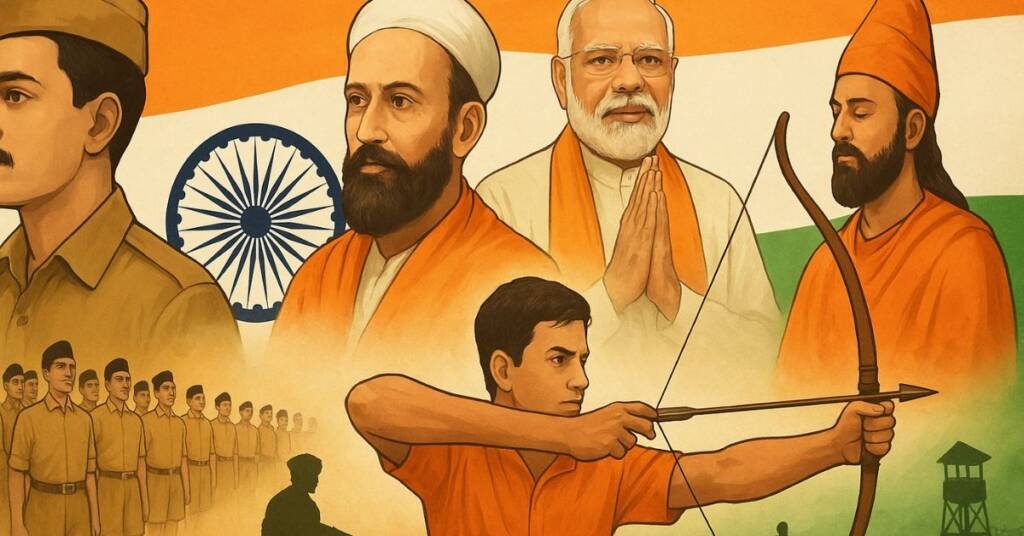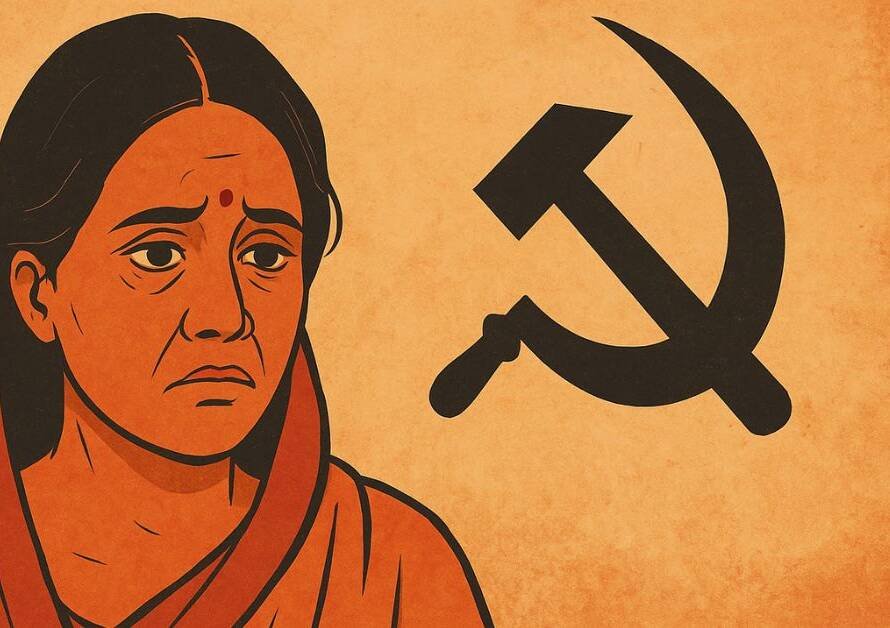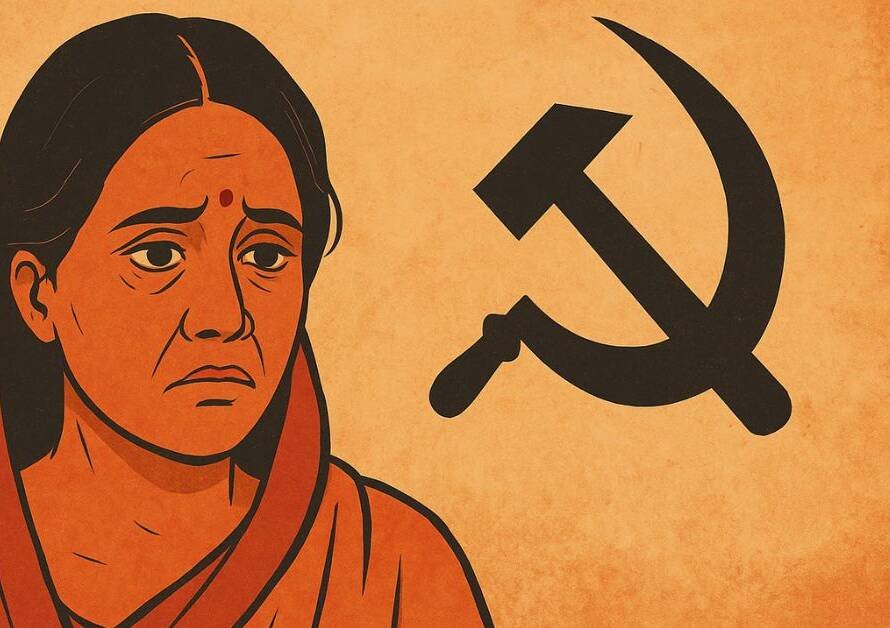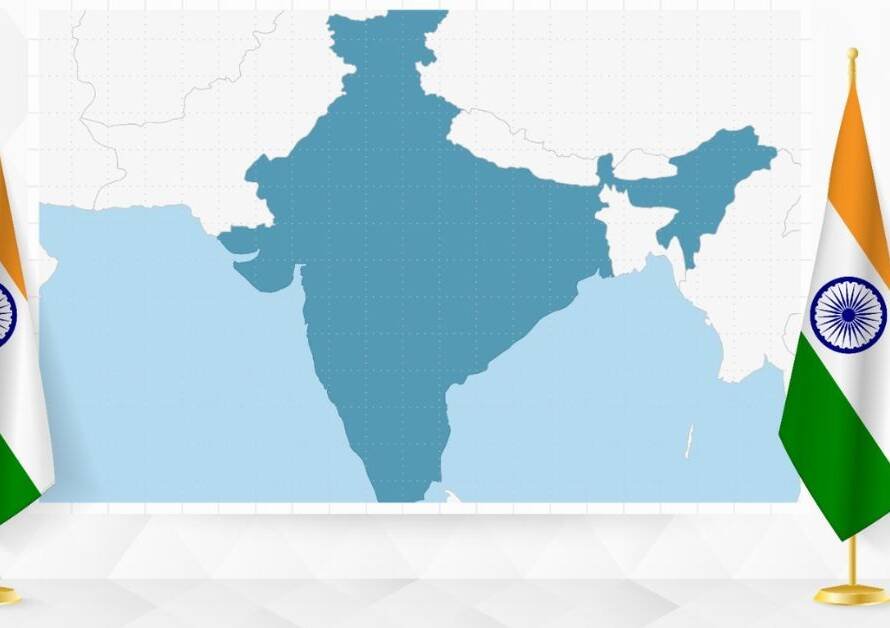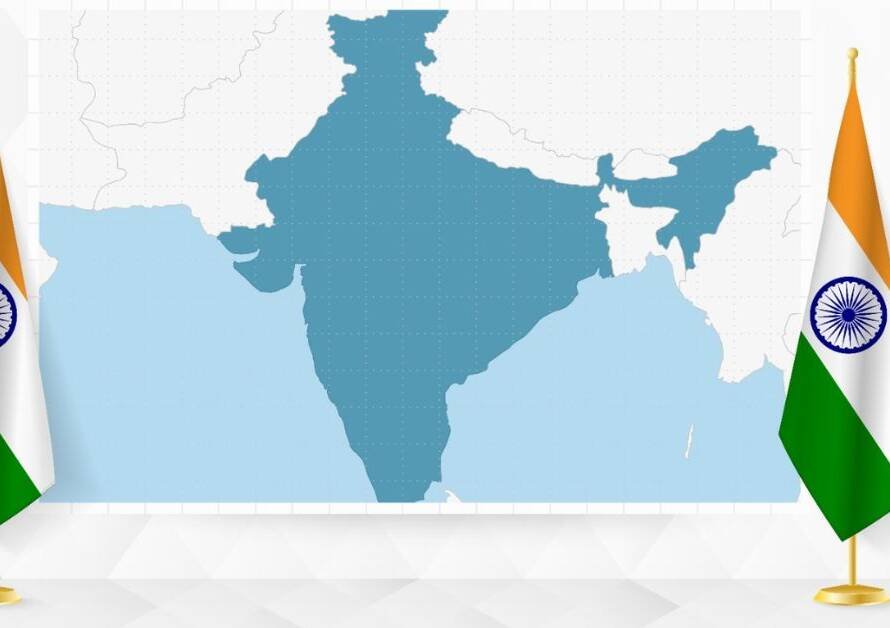- India’s internal stability and security are deeply intertwined with the ideological and organizational strength of the Rashtriya Swayamsevak Sangh (RSS) and its affiliated organizations.
- In the current era of hybrid warfare — where external threats combine with internal subversion, propaganda, and demographic challenges-
- The coordinated unity between the RSS network and the BJP becomes vital for safeguarding Bharat’s sovereignty and civilizational identity.
1️⃣ RSS and Its Affiliates — A Legacy of Discipline and National Awakening
- The Rashtriya Swayamsevak Sangh (RSS), founded in 1925 by Dr. Keshav Baliram Hedgewar, was born out of a vision to rebuild Bharat’s spiritual and cultural confidence after centuries of foreign subjugation.
- The RSS aims to unite Hindu society across caste, creed, and regional divides, instilling discipline, national pride, and a sense of duty toward Dharma and the Nation.
Its major affiliates include:
- Vishva Hindu Parishad (VHP): Focused on cultural revival, temple reconstruction, and social harmony among Hindus.
- Bajrang Dal: The youth wing, dedicated to self-defense, social service, and resistance to religious conversion and radicalism.
- Akhada Parishad: The ancient monastic force representing India’s spiritual warriors — preserving both Sanatana Dharma and martial discipline.
- These organizations operate at both grassroots and national levels — providing ideological strength, social outreach, and emergency response capabilities in times of crisis.
- The BJP, as the political arm inspired by the Sangh ideology, transforms this cultural and social energy into actionable governance and national policy.
2️⃣ BJP’s Internal Security Vision and RSS’s Role
- Over the past decade, the BJP government under Prime Minister Narendra Modi has made remarkable strides in strengthening internal security, national unity, and counter-terror operations.
- The abrogation of Article 370 in Jammu & Kashmir was a turning point — restoring constitutional integrity and dismantling decades of separatist appeasement.
Key milestones include:
- Decisive actions against terrorist networks and sleeper cells across India.
- Operation Sindoor (2025) — a landmark counter-terror initiative that neutralized extremist bases and foreign-funded modules.
- Improved intelligence coordination through agencies like NIA and IB, reducing terror infiltration along borders.
- Crackdown on Maoist and separatist movements in Chhattisgarh, Jharkhand, and the Northeast, ensuring that India’s territorial integrity remains intact.
- At the grassroots level, the RSS and its affiliates have supported this vision through social mobilization, awareness campaigns, and nationalistic education programs.
- Their work complements government efforts by nurturing patriotic consciousness and resilience within society.
3️⃣ The Necessity of Socio-Political Unity
- India’s greatest challenge is not merely external aggression but internal disunity and ideological fragmentation.
- Political opportunism, religious appeasement, and foreign-funded activism often create divisions that weaken Bharat from within.
- Hence, the harmony between the Sangh Parivar and the BJP is not optional — it is essential.
The RSS, VHP, Bajrang Dal, and Akhada Parishad must therefore:
- Strengthen local communities through social awareness drives and national education programs.
- Promote Hindu unity beyond caste and linguistic barriers.
- Mobilize volunteers for disaster relief, civic engagement, and defense preparedness.
- Encourage spiritual nationalism — where faith and patriotism merge into a single moral force for protecting the nation.
This unified approach builds resilience against divisive forces and reinforces India’s civilizational fabric.
4️⃣ Hindutva and National Security — The Strategic Perspective
- The Hindutva philosophy of the RSS is not merely a religious idea but a comprehensive civilizational worldview.
- It sees the nation as a living cultural organism — where unity, discipline, and spirituality define national strength. This has profoundly shaped India’s defense doctrine and internal security strategy.
- The cultural awakening within the armed forces — sometimes labeled as “Saffronisation” — is, in truth, a revival of India’s ancient warrior spirit.
- Soldiers now draw inspiration from Bhagavad Gita, Chanakya Niti, and Kshatriya Dharma, reinforcing moral courage and patriotic zeal.
- The blending of spiritual strength with modern military efficiency is forging a new Indian strategic culture — rooted in Dharma, discipline, and decisiveness.
5️⃣ Economic and Geopolitical Challenges
- India’s national security is incomplete without economic sovereignty. In 2025, when the United States imposed a 50% tariff on Indian goods, it tested the resilience of Bharat’s economy.
- Yet, under the current government, India managed to maintain energy security, expand exports to new partners, and reduce Western dependency.
- Despite global headwinds — trade wars, resource competition, and currency manipulation — India’s leadership has prioritized economic nationalism and self-reliance (Atmanirbhar Bharat).
- The RSS and its affiliates, through initiatives like Swadeshi Jagran Manch, have consistently promoted indigenous production, self-employment, and cultural economics that empower local communities and reduce vulnerability to foreign manipulation.
6️⃣ Building a Culture of Self-Defense and Preparedness
National security is not only the government’s duty — it is a collective responsibility. The concept of self-defense (Atma Raksha) in the Sangh ideology extends beyond physical protection to include cultural, informational, and social security. The Sangh Parivar must:
- Expand training programs for youth in disaster response, self-defence cyber awareness, and ideological literacy.
- Strengthen communication networks to counter misinformation and psychological warfare.
- Organize Shakhas and Seva Kendras focused on national service, skill-building, and civic discipline.
- Encourage citizens to act as sentinels of society — informed, alert, and devoted to Bharat’s unity.
Every patriot must view himself or herself as a soldier of Dharma — protecting the nation not just with arms, but with awareness and action.
7️⃣ Collective Unity Is the Foundation of National Security
- In today’s volatile world, India faces a complex mix of external aggression and internal subversion.
- Defending Bharat’s sovereignty requires synchronized action between political leadership, civil society, and cultural institutions.
- The RSS, VHP, Bajrang Dal, Akhada Parishad, and other affiliates must remain in full alignment with the BJP’s national vision.
- The unity of these forces ensures that nationalism remains the moral compass guiding governance, social reform, and defense.
- Only through such collective awakening can Bharat preserve its civilizational continuity and secure its global destiny.
India’s future depends on unity, discipline, and unwavering faith in Sanatana Dharma — the eternal foundation of this civilization.
🇮🇳 जय भारत, वन्देमातरम 🇮🇳
For old Blogs please visit our website www.saveindia108.in
To join our whatsapp Community please click
https://chat.whatsapp.com/FMr2WNIgrUVG9xK78FW5Dl?mode=r_t
To join our Telegram group please Click https://t.me/+T2nsHyG7NA83Yzdl Old Blogs are available on the telegram group also.

